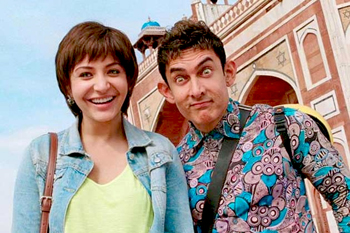 Mumbai, Dec 19: "Jo darr gaya, wo mandir gaya." It’s difficult to convince you of our impartiality with such a header, but this is where our job begins. In my defense, I begin by telling you that PK is the most ‘different’ Aamir Khan film you have ever seen. Now, let’s start cracking the code.
Mumbai, Dec 19: "Jo darr gaya, wo mandir gaya." It’s difficult to convince you of our impartiality with such a header, but this is where our job begins. In my defense, I begin by telling you that PK is the most ‘different’ Aamir Khan film you have ever seen. Now, let’s start cracking the code.
PK (Aamir Khan) is not his name. In fact, he has no name. His clan doesn’t believe in alienating people on their name, caste, creed, language or religion. Sounds like the preamble of our Constitution? Well, this is the essence of director Rajkumar Hirani’s PK. And it is high on emotions and full of drama.
Who is PK then? Well, he is a humanitarian, who lives in the hearts of millions. See, I am trying to be as secretive as possible about his distinctiveness. Let’s join threads from the scene all of you have seen in the promos. Of course, the transistor scene. So, here is a guy with unblinking eyes, fluttering ears and toned muscles walking towards the most treacherous of places -- in the middle of a desert. He is in Rajasthan. This man is helpless against people who have no moral qualms in making the earth a worse place than what it already is. But he is a firm believer in all things good, and therefore keeps going and soon finds himself in the middle of a megacity -- Delhi, the national capital.
The second part of his adventures begins in Delhi -- He is intrigued by the rules and ways of this big city. PK explores the big bad world with charming innocence and a lot of wit. All of a sudden, he finds himself pitted against a widely followed godman Tapasvi Jee (Saurabh Shukla), and the only person he can trust in this ‘holy’ war is Jagat Janani (Anushka Sharma), a news reporter.
Let's leave the character details here and get down to the nitty-gritties of the theme.
First things first. What is the film about? PK is a man’s journey through the paradoxes of Indian society. He cannot understand the meaning of religion, or the rituals most people busy themselves with. He cannot differentiate between a Hindu and a Muslim. He wonders why godmen ask for money. He disapproves the absurdities that make believers against believers. Think it is too much like Oh My God?
PK's problems are no different from those faced by Kanji Bhai. But the undertone is diagonally opposite. If it was atheists versus believers in OMG, PK showcases a tussle between believers of two different streams. Nobody is denying the existence of god (They didn’t do it in OMG either), but they are not willing to follow the norms set by the managers of religion. Yes, this is the term Hirani has used for godmen and it fits to the core.
This is one masterstroke for a simple reason. India is a country that deals with evils such as poverty, lack of basic amenities and religious corruption. In such a scenario, the almighty becomes the only guiding light. It doesn’t ease off your problems but gives you the strength to sail through the bad weather. It may not sound politically correct, but it suits the popular sentiment. That is to find the root of the problems inside the ‘immediate’ domain, inside your ‘local’ society.
Probably this is the cause behind Hirani’s fascination with the Gandhian philosophy. Bapu didn’t invoke the idea of armed repulsion but infused the unarmed masses with the pride of being a rebellion. This worked at two levels. First, it prepared the followers for a long and ruthless battle which would see many of them crushed under the boots of British army. Second, it complemented our old belief that a physically inferior guy can be heard if he can convince others of his pain. PK has characteristics that’ll remind you of the penetrating power of Gandhian philosophy. He is not a naïve guy, but he believes in others’ virtues. He gets bitten, cries and then goes back to the work he has been doing, like most of us.
There are some very powerful scenes in the film that will make you cry, uneasy in seat, and even laugh sheepishly at times. In one of the remarkable sequences, PK realises that small pieces of paper with an imprint of Gandhi Jee can buy him carrots. He collects big pictures of Gandhi Jee from adjacent walls and gives them to a vendor only to be scolded back in return. Then he says, “Gandhi Jee ki photo ki value sirf ek tarah ke kagaz pe hi hai.”
In another sequence, he goes to a church and watches people offering wine. Unfortunately, he tries to repeat the same inside a mosque and says, “Lagta hai bhagwan ko nariyal paani me maza nahi aa raha tha.” You can easily guess the result.
The makers haven’t spared any major religion of the Indian subcontinent. They have shown some Muslim girls being stopped from going to school in the wake of a fatwa. They didn’t know that something drastic will happen in Pakistan just before the release of PK.
The concept exposes the business of fear: It touches on how everybody from the religious leaders to media pundits are utilising fear to further their own business, or even how it is the biggest threat staring at us today.
Sushant Singh Rajput plays Sarfaraz, a Pakistani who falls victim to the hate game, but ultimately his issue gets resolved because of the open mindedness of some Indians. Didn’t we see #IndiaWithPak
trending on Twitter just a couple of days ago? On second thoughts, there couldn’t be a better timing for the film’s release.
The screenplay is linear and full of ‘talkative’ scenes. The story is perfectly paced at least in the first half. The latter part of the second half is extremely dramatic with crying characters live on air and immediate change of hearts but that’s more like giving the story a logical conclusion. Yes, it appears ‘over the top’ but not for more than five minutes, and that are the only dull moments. In PK’s language ‘lull hai’.
It’s Aamir Khan’s show all the way. It’s amusing to see him make an otherwise ‘absurd concept on paper’ plausible. He is the master of disguise and it’s good to see such a ‘projectionist’ on top of his game. PK will always remain among the most cherished characters in his kitty.
Anushka Sharma is radiant and she is growing in stature. She seems confident and holds her fort in front of Aamir. By the way, her lips didn’t look any different to me, don’t know about you. Saurabh Shukla is the spine of the drama and as expected he doesn’t disappoint.
PK is a fun film with proper dose of ‘gyaan’. It’s a film that shouldn’t be missed and it’s brave because it attempts to create a better world. Another winner from Rajkumar Hirani. It would be hard to stop it from owning the box-office as well.
And yes, don’t leave the theatre till the credit rolls. There is a surprise for you.






Comments
Add new comment